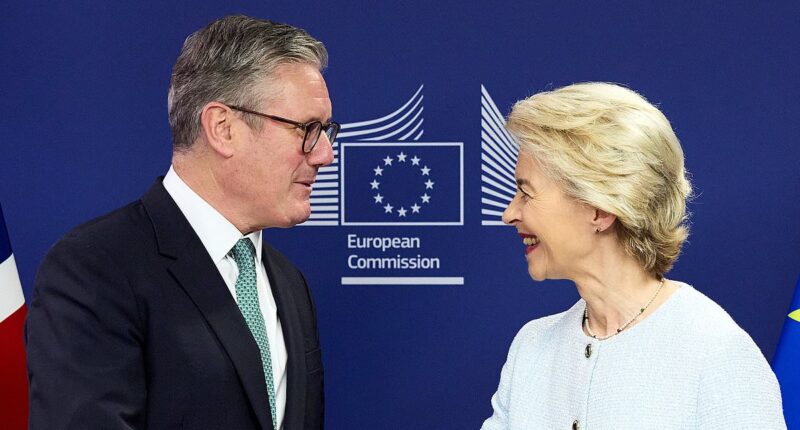Struggling businesses are facing higher costs as Keir Starmer seeks to link Britain to the EU’s green scheme.
The Prime Minister, in Brussels today for his ‘reset’ five years post-Brexit, aims to harmonize the UK’s emissions scheme with the European Union’s.
However, analysts and Leave campaigners argue that this step may escalate prices for struggling UK energy and manufacturing companies due to the higher carbon prices in Europe.
Concerns arise that this alignment could lead to increased electricity costs for both households and businesses that need to purchase permits to counterbalance their emissions. Additionally, it may revive accusations that Labour is attempting to overturn Brexit by potentially reintroducing EU regulations.
However, major industries including steel and power generation are said to support Labour’s plan as a way of avoiding a looming EU carbon tariff.
It comes as Sir Keir prepares to attend an ‘informal meeting’ with the 27 leaders of the bloc in the Belgian capital today, having hosted German chancellor Olaf Scholz for talks at the PM’s country retreat Chequers yesterday.
He will ‘set out his pitch’ for an ‘ambitious’ new defence and security agreement, Downing Street said last night, as part of his vow of ‘making Brexit work better for the British people’.

Prime Minister Keir Starmer shakes hands with European Commission president Ursula von der Leyen in Brussels

Major industries including steel and power generation are said to support Labour’s plan

Until recently the price of a tonne of carbon on the British market has been as little as £35, far lower than the £70 in the EU
But in return he will face demands for the UK to give way on fishing rights and a youth mobility scheme, as well as signing up to ‘full dynamic alignment’ with European law on the carbon schemes.
Conservative peer and former Brexit negotiator Lord Frost told the Mail: ‘It makes no sense to lock us into EU net zero policy by adopting their emissions trading scheme.
‘Not only do we lose control of our own rules, joining the EU’s will be even more expensive and push our costs even higher. We should be doing everything possible to wind down the net zero madness and going our own way.’
Tory business spokesman Andrew Griffith added: ‘If Labour drag the UK back into more EU emission regulations, they will add more costs to businesses and for consumers.’
Former business secretary Jacob Rees-Mogg said: ‘Emissions trading schemes are a means of making energy more expensive. They should be abolished if we want growth. Rejoining the EU scheme would raise costs and lose business.’
After Brexit, the UK set up its own emissions trading scheme – a system which forces firms to buy permits if they pollute more than an annual cap set on greenhouse gas emissions.
Until recently the price of a tonne of carbon on the British market has been as little as £35, far lower than the £70 in the EU. But in the past week, the UK price has passed £45 after it was reported that Sir Keir wanted to align the two markets. It means British firms are already having to spend more to buy the permits – and would be landed with even higher costs if the schemes were aligned.
This could be passed on in higher electricity bills to consumers, because power-generating firms have to pay for their emissions.
Utility policy analyst Steve Loftus said the price of moving to the EU scheme could be as high as £3.7 billion a year.

Tory business spokesman Andrew Griffith warned the move would add more costs to businesses and consumers

Former business secretary Jacob Rees-Mogg said emissions trading schemes ‘should be abolished’
Separate research by the Tories suggests that the bill for big businesses could be as high as £2 billion in a year to buy carbon at the higher price. Independent energy consultant Kathryn Porter, of Watt Logic, said: ‘Linking the UK and EU emissions trading schemes will make carbon emissions more expensive.
‘Making any goods created through the use of fossil fuels will become more expensive, which will be very inflationary.
‘It will increase the UK’s already very expensive industrial electricity prices – it’s no wonder industry is leaving and jobs are being lost.’
But industry representatives insist that big businesses support Labour’s plan to link the two markets, saying the UK’s independent system has been too volatile. And they want Britain to be exempt from the introduction by Brussels next year of a new tariff on imports of dirty energy, known as Carbon Border Adjustment Mechanisms (CBAM).
Industry figures believe this new tax will dwarf the extra costs firms will have to shoulder from a higher carbon price.
A government spokesman said: ‘Under the terms of the Trade and Cooperation Agreement, the UK Government and EU agreed to consider linking our respective carbon pricing schemes and to cooperate on carbon pricing.’

















